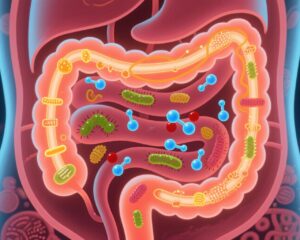Highlight
- Daily blueberry consumption during the complementary feeding period improves resolution of allergy symptoms in breastfed infants.
- Blueberry intake significantly reduces pro-inflammatory IL-13 and tends to increase anti-inflammatory IL-10 serum levels.
- Blueberry consumption shifts gut microbiota composition, correlating specific bacterial taxa with immune biomarkers.
- These integrative effects point to blueberries as a promising early complementary food for modulating infant immune development and microbial ecology.
Study Background and Disease Burden
Complementary feeding, the introduction of solid foods alongside breastmilk, represents a critical developmental phase for shaping an infant’s nutrition, gut microbiota, and immune system maturation. Early life is also a vulnerable window for the emergence of allergic diseases such as eczema, food allergies, and atopic manifestations, which affect a growing proportion of children worldwide and may predispose to chronic allergic conditions. Despite epidemiological evidence linking diet and allergy risk, the role of specific complementary foods, especially fruits rich in bioactives like blueberries, remains insufficiently characterized. Blueberries are rich in polyphenols, antioxidants, and anti-inflammatory compounds that might influence immune pathways and gut microbial ecology. However, clear clinical data on blueberry consumption during infancy and its effects on allergy symptoms, immune biomarkers, and gut microbiota composition are lacking. Addressing this gap holds potential for developing food-based strategies to prevent or mitigate allergic conditions early in life.
Study Design
This investigation was a double-blind, randomized, placebo-controlled trial conducted in breastfed infants from the Denver metropolitan area. The study enrolled 76 infants aged 5 months, who were randomized to receive either up to 10 grams per day of freeze-dried blueberry powder or an isocaloric placebo from 5 to 12 months of age, coinciding with the complementary feeding period. The intervention ensured comparable caloric intake while isolating the effect of blueberry bioactives. Data collection included baseline and end-of-study caregiver-reported allergic symptom assessments, serum sampling for immune biomarkers (notably IL-10 and IL-13, which are markers of anti- and pro-inflammatory immune responses respectively), and stool samples for gut microbiota analysis. Sixty-one infants completed the study (blueberry group, n=30; placebo, n=31).
Key Findings
Infants receiving daily blueberry supplementation demonstrated significantly different trajectories of allergy-related symptoms compared with placebo. Notably, despite a higher prevalence of symptoms at baseline in the blueberry group, these infants exhibited a significantly greater rate of symptom resolution by 12 months (p=0.05). This suggests a potential therapeutic or preventive effect of blueberries on infantile allergy manifestations.
Immunologically, the blueberry group showed a significant reduction in serum IL-13 levels (p=0.035), a cytokine implicated in promoting allergic inflammation and asthma pathogenesis. Anti-inflammatory IL-10 levels also trended upward (p=0.052), bordering statistical significance, indicating a possible shift towards immune regulation. Interestingly, changes in allergy symptoms were not directly correlated with IL-10 or IL-13 levels, highlighting the complex and multifactorial nature of allergy development and immune modulation.
Microbiota analysis revealed distinct correlations between bacterial taxa and immune biomarkers. At 12 months, the relative abundances of Lacticaseibacillus, Blautia, and Peptostreptococcaceae were negatively associated with IL-10 levels, whereas Lactobacillus, Clostridiaceae, and Megasphaera positively correlated with IL-10. IL-13 demonstrated a positive association with Citrobacter and negative associations with Anaerostipes and Blautia. These findings imply that blueberry consumption influences gut bacterial populations that are linked to systemic immune responses, potentially mediating the observed effects on immune biomarkers and allergy outcomes.
Expert Commentary
Dr. Clare Venter and colleagues’ randomized trial establishes important clinical and biological groundwork for understanding how early dietary interventions with blueberries might impact infant allergy and immunity. The study’s robust double-blind design, coupled with integrated clinical, immunological, and microbiome evaluations, strengthens confidence in the observed associations.
Nevertheless, several points merit discussion. First, the absence of a direct link between immune biomarkers and symptom changes reflects the complexity of allergic disease mechanisms, suggesting that other immune and non-immune factors may be involved. Second, the baseline imbalance with more symptoms in the blueberry group could have influenced results, though this was accounted for in longitudinal analyses. Third, while freeze-dried blueberry powder is a practical intervention, the specific bioactive compounds responsible – possibly polyphenols or flavonoids – remain to be identified, warranting targeted biochemical analyses.
This trial complements emerging literature implicating early diet-microbiome-immune crosstalk as a modifiable axis for allergy prevention. Future investigations could explore the dose-response relationships, longer-term allergy outcomes, and effects of other complementary foods rich in bioactives. Mechanistic studies dissecting molecular pathways linking gut microbes and systemic immunity will enhance biological plausibility and therapeutic target identification.
Conclusion
This pioneering randomized controlled trial suggests that daily blueberry consumption during the complementary feeding period may beneficially modulate allergy symptom resolution, immune biomarker profiles, and gut microbiota composition in breastfed infants. These findings endorse blueberries as a promising functional complementary food that supports immune health and microbiome development, with potential implications for allergy prevention strategies. Ongoing and future research should aim to characterize the active nutrients in blueberries, define their mechanistic roles, and validate these effects in diverse populations and clinical settings.
References
1. Venter C, Boden S, Pickett-Nairne K, O’Mahony L, Glime GNE, Matzeller KL, Frank DN, Kotter C, Kofonow JM, Robertson CE, Campbell WW, Krebs NF, Tang M. Blueberry Consumption in Early Life and Its Effects on Allergy, Immune Biomarkers, and Their Association with the Gut Microbiome. Nutrients. 2025 Aug 28;17(17):2795. doi: 10.3390/nu17172795. PMID: 40944184; PMCID: PMC12430458.
2. Prescott SL, Björkstén B, Kabesch M, et al. Allergy and the gastrointestinal microbiota during childhood. Clin Exp Allergy. 2017;47(3):322-329.
3. West CE, Jenmalm MC, Prescott SL. The gut microbiota and its role in the development of allergic disease: a wider perspective. Clin Exp Allergy. 2015;45(1):43-53.
4. Torday JS, Rehan VK. The Role of Cellular Signaling in the Origin of Chronic Lung Disease. Pediatrics. 2016;137(1).


